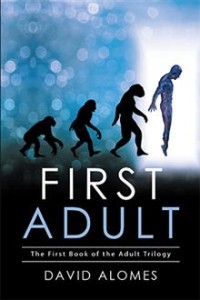Title: First Adult: The First Book of the Adult Trilogy
Author: David Alomes
Publisher: XlibrisAU
ISBN: 9781514497371
Pages: 152
Genre: Fiction/General
Reviewed by: CC Thomas
Buy on Amazon
Pacific Book Review
Of all the planets, of all the galaxies, why would you have to pick this joint? Author David Alomes takes the age-old question, “Are aliens searching for us?” and twists it to “Why in the world would they want to pick us?” That subtle difference in wording makes for all the difference in the world. First Adult, by David Alomes, takes a close look at the relationship between an alien species who has chosen mankind as the harbinger of its stories and the subject of this chosen human exemplar.
So, they picked us to keep their stories. That answers the question of why, right? Not at all. The real question in this book is the question of our own humanity and what it means to be a human being. Ikara, one of the main characters in the book, is the alien who has selected Samuel to be the recipient of his “story,” an act that will either cause Samuel to evolve into a better version of a human being or…will kill him. Samuel is up for the challenge and the ensuing struggle shows what happens as Samuel tries to understand what it means to be a human being without some of these pesky emotions and irrationalities that can get in the way. The struggle, though, revolves around the understanding that these irrationalities are part of what actually defines us as a human species.
Which begs another question; In a futuristic world, wouldn’t man have evolved into a different kind of creature already, a better creature without the same emotional yearnings that bog us down today? If you’re a fan of sci-fi, then you’ll understand the philosophical ponderings these types of books can cause. It’s easy to see the mistakes and consequences of the characters in the book, but those consequences are what makes for such intriguing personalities. After all, if life isn’t interesting, what’s the point of it all? However, you don’t have to be a futuristic fan to enjoy these kinds of questions and dilemmas because your personal answers and musings also point the way to present day understandings of personal behavior.
Another enjoyable feature of the book is the shift in point of view. Many of the minor characters are given due diligence to see what makes them tick. These glimpses into their thoughts, lives, and past mistakes also bears on the choices and consequences of the main characters, Ikara and Samuel. This book, much like our own world, has invisible threads that tie each of us to the other. Samuel’s ability, or inability, to assimilate will affect those around him and all humanity in the future, not to mention Ikara and his species and issues.
So, was Samuel successful? Can you sleep easier at night knowing the fate of humanity, and Ikara’s race, is saved? Not only will I not give away the ending, I’ll do one better. Humanity is much too difficult to be understood within these few pages. Alomes doesn’t do an easy out, one of those hated deus ex machinas. Instead, he just wets your appetite for more. This installment is the first in the series. So, when reading, don’t fear about your favorite characters (who likely won’t be either Samuel or Ikara) because their messy fates and deliciously complex problems are only beginning.



Follow Us